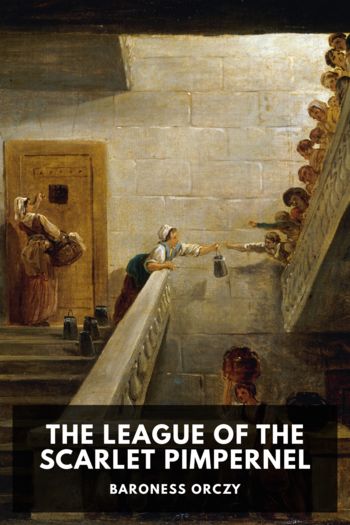The Triumph of the Scarlet Pimpernel by Baroness Orczy (story reading .TXT) 📕

- Author: Baroness Orczy
Book online «The Triumph of the Scarlet Pimpernel by Baroness Orczy (story reading .TXT) 📕». Author Baroness Orczy
“I am lost, Theresia!” he moan pitiably. “Hide me, for God’s sake! … only for tonight!”
Theresia Cabarrus was frowning now, looked more perplexed than kindly, and certainly made no attempt to raise the crouching figure from the ground. Anon she called loudly: “Pepita!” and whilst waiting for an answer to this call, she remained quite still, and the frown of puzzlement on her face yielded to one of fear. The young man, obviously only half conscious, continued to moan and to implore.
“Silence, you fool!” she said peremptorily. “The door is still open. Anyone on the stairs could hear you. Pepita!” she called again, more harshly this time.
The next moment an old woman came from somewhere out of the darkness, threw up her hands at sight of that grovelling figure on the floor, and would no doubt have broken out in loud lament but that her young mistress ordered her at once to close the door.
“Then help the citoyen Moncrif to a sofa in my room,” the beautiful Theresia went on peremptorily. “Give him a restorative and see above all to it that he hold his tongue!”
With a quick imperious jerk she freed herself from the convulsive grasp of the young man, and walking quickly across the small vestibule, she went through a door at the end of it that had been left ajar, leaving the unfortunate Moncrif to the ministrations of Pepita.
IIITheresia Cabarrus, who had obtained a divorce from her husband, the Marquis de Fontenay (by virtue of a decree of the former Legislative Assembly, which allowed—nay, encouraged—the dissolution of a marriage with an émigré who refused to return to France). Theresia Cabarrus was, in this year 1794, in her twenty-fourth year, and perhaps in the zenith of her beauty and in the plenitude of that power which had subjugated so many men. In what that power consisted the historian has vainly tried to guess; for it was not her beauty only that brought so many to her feet. In the small oval face, the pointed chin, the full, sensuous lips, so typically Spanish, we look in vain for traces of that beauty which we are told surpassed that of other women of her time; whilst in the dark, velvety eyes, more tender than spiritual, and in the narrow arched brows, we fail to find an expression of the esprit which had moulded Tallien to her will and even brought Robespierre out of the shell of his asceticism—a willing victim to her wiles.
But who would be bold enough to analyse that subtle quality, acknowledged by all, possessed by a very few, which is vaguely denoted by the word “charm”? Theresia Cabarrus must have possessed it to a marvellous degree—that, and an utter callousness for the feelings of her victims, which would leave her mind cool and keen to pursue her own ends, whilst theirs was thrown into that maze of jealousy and of passion wherein prudence flies to the winds and the fever of self-immolation gets into the blood.
At this moment, in the sparsely furnished room of her dingy apartment, she looked like an angry goddess. Her figure, which undeniably was superb, was drawn to its full height, its splendid proportions accentuated by the clinging folds of her modish gown—a marvel of artistic scantiness, which only half concealed the perfectly modelled bust, and left the rounded thigh, in its skintight, flesh-coloured undergarment, unblushingly exposed. Her blue-black hair was dressed in the new fashion, copied from ancient Greece and snooded by a glittering antique fillet; and her small bare feet were encased in satin sandals. Truly a lovely woman, but for that air of cold displeasure coupled with fear, which marred the harmony of the dainty, childlike features.
After awhile Pepita came back.
“Well?” queried Theresia impatiently.
“Poor M. Bertrand is very ill,” the old Spanish woman replied with unconcealed sympathy. “He has fever, the poor cabbage. Bed is the only place for him …”
“He cannot stay here, as thou well knowest, Pepita,” the imperious beauty retorted drily. “Thy head and mine are in danger every moment that he spends under this roof.”
“But thou couldst not turn a sick man out into the streets in the middle of the night.”
“Why not?” Theresia riposted coldly. “It is a beautiful and balmy night. Why not?” she reiterated fretfully.
“Because he would die on thy doorstep,” was old Pepita’s muttered reply.
Theresia shrugged her shoulders.
“He dies if he goes,” she said slowly, “and we die if he stays. Tell him to go, Pepita, ere citizen Tallien comes.”
A shudder went through the old woman’s spare frame.
“It is late,” she protested. “Citizen Tallien will not come tonight.”
“Not only he,” Theresia rejoined coldly, “but—but—the other—Thou knowest well, Pepita—those two arranged to meet here in my lodgings tonight.”
“But not at this hour!”
“After the sitting of the Convention.”
“It is nearly midnight. They’ll not come,” the old woman persisted obstinately.
“They arranged to meet here, to talk over certain matters which interest their party,” citoyenne Cabarrus went on, equally firmly. “They’ll not fail. So tell citizen Moncrif to go, Pepita. He endangers my life by staying here.”
“Then do the dirty work thyself,” the old woman muttered sullenly. “I’ll not be a part to cold-blooded murder.”
“Well, since citizen Moncrif’s life is more valuable to thee than mine—”
Theresia began, but got no father. The words died on her lips.
Bertrand Moncrif, very pale, still looking scared and wild, had quietly entered the room.
“You wish me to go, Theresia,” he said simply. “You did not think surely that I would do anything that might endanger your safety. My God!” he added with





Comments (0)